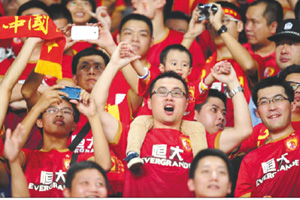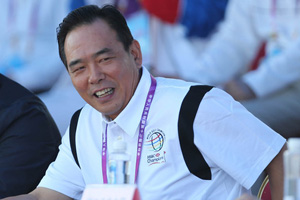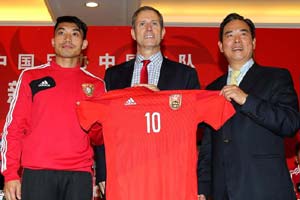As China's national soccer team continues to produce uninspiring performances, officials are placing their hopes for the future in a shakeup of the soccer league system in schools and colleges.
The national soccer team disappointed fans and officials on Wednesday with a lackluster performance in a qualifying match for the 2015 Asian Cup, losing 1-3 to Iraq.
China's team still managed to scrape through into the finals of the competition, which will be played in Australia, but only by winning "best third place" because they lost fewer goals than Lebanon.
Criticism of the Chinese team's performance spread quickly on Sina Weibo, China's largest social media platform, reflecting a general discontent with the shape of the sport.
Chinese soccer has been struggling over the past decade, hampered by disappointing international results and corruption scandals.
Some have attributed failure at the top level to a shrinking talent pool, resulting from the lack of training and competition experience among young players.
In response, some influential figures have called on sports and education authorities to create a multilevel campus league linking schools and universities across the country.
Xu Jiayin, owner of the Asian champion Guangzhou Evergrande club and a member of the standing committee of the Chinese People's Political Consultative Congress, is backing the plan.
At the CPPCC's meeting on Tuesday, he proposed that the Ministry of Education should take charge of youth soccer development, which is currently the responsibility of the Chinese Football Association.
"The chaos in youth soccer management has resulted in the poor operation of youth leagues and problems with resource allocation," Xu said in his proposal.
"The CFA should hand over responsibility to the Education Ministry so that a real campus league for normal students - not just for registered junior players - can be established, covering thousands of primary and secondary schools across the country."
Under the current system, China's youth training structure relies on the reserve training systems of 16 top-league professional clubs under the CFA, with talent only rarely being drafted from campuses.
By comparison, Asian powerhouse Japan built a pyramid system in the 1990s, channeling primary and secondary school leagues to university leagues and then into professional divisions.
Thanks to the system, Japan now has more than 800,000 under-18 players registered, according to the CFA figures, and its men's team has reached the World Cup's knockout stage twice, in 2002 and 2010.
In contrast, the number of Chinese student players has shrunk significantly due to the game's tarnished reputation, which has also resulted in the closure of many private soccer academies.
Zhang Jian, secretary-general of the CFA, said that 190,000 student players are registered at local sports authorities, less than one-third of the amount in 1995. The number of soccer schools has dropped from around 1,000 in the 1990s to just 20 today.
Faced with these grim statistics, the Ministry of Education agrees that the time for action has arrived and is backing the new proposal.
"We agreed with Xu's idea and are working closely with the CFA to set up the league system," said Wang Dengfeng, director of the ministry's physical education, health and art department, on Wednesday.
He said the ministry will urge every public school to build at least one five-a-side soccer pitch and hire professional youth soccer trainers by 2016. It will also provide policy and financial support to set up a four-tier league system with the CFA that links primary schools to universities.
Soccer will be introduced as mandatory physical education for more than 5,000 primary and secondary schools nationwide, he said.
Such moves would be welcomed by many school officials and parents.
Guo Dacheng, CPPCC member and Party chief of the Beijing Institute of Technology, said the establishment of an intercollegiate league is urgently needed.
"If we have a league just for student players, I believe more colleges will organize and develop their own teams," said Guo.
|
 |
 |
 |
|
|
|
|
|
|
|
|